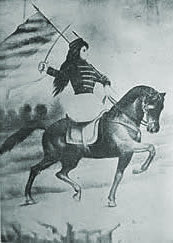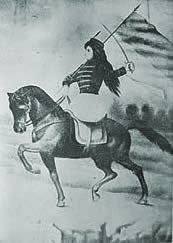
|
Women and Independence in Latin America An exploration of women's involvement in the Latin American Wars of Independence |

|

|
Women and Independence in Latin America An exploration of women's involvement in the Latin American Wars of Independence |

|
Gender:Female
Ethnic origen: White
Events:
| 1809 | - | Paris | - | Not applicable | - | She was born here |
| 1816 | - | Rio de Janeiro | - | Unknown | - | She moved to Brazil with her mother. |
| 1834 | - | Rio de Janeiro | - | Unknown | - | She gained her diploma in midwifery from the Faculty of Medicine in Rio. |
| 1834-1884 | - | Rio de Janeiro | - | Unknown | - | She worked as a midwife in Rio de Janeiro and delivered the children of the Princess Leopoldina, daughter of Pedro II. |
| 1871 | - | Rio de Janeiro | - | Unknown | - | She published "Idéias a respeito da emancipação" |
| 1893 | - | Rio de Janeiro | - | Unknown | - | She died in Rio de Janeiro on 25 December 1893. |
Connections:
NursesBiography:
Madame Durocher, as she is generally known, was born in Paris in January 1808/09? (Mott (1994), 109). Her mother, Ana Colette Durocher, was from Nancy, her father is unknown (Mott (1994), 102). In 1816 mother and daughter emigrated to Brazil for reasons which are not clear. Her mother established a fabric shop in Rio de Janeiro and sent her daughter to school to learn Portuguese, English and German. Madame Durocher had two children with a Frenchman Pierre David, although they did not marry and he died when the children were still young (Mott (1992), 39).
In order to support her family she enrolled on the midwifery course at the newly opened Faculty of Medicine in Rio de Janeiro, from where she gained her diploma in 1834. She was the first female student of the Faculty and one of very few women to study there throughout the nineteenth century (Mott (1994), 115). She worked as a midwife in the capital for more than fifty years, and occupied the position of Imperial midwife, delivering the children of the Princess Leopoldina, daughter of Pedro II. She was the first, and for many years the only female member of the Imperial Academy of Medicine (Mott (1992), 40). She was considered to be an excellent midwife and the centenary of her arrival in Brazil was celebrated by the National Academy of Medicine in 1916. However she was also thought to be “bizarra” (Mott (1992), 40) for her masculine clothes and mannerisms. She published a large number of medical tracts, many of them in the Annaes da Academia Imperial de Medicina, a history of midwifery and a discussion of abolition. She died in Rio on 25 December 1893.
References:
Bernardes, Maria Thereza Caiuby Crescenti (1989) Mulheres de Ontem?: Rio de Janeiro, século XIX
Blake, A V A Sacramento (1900) Diccionario Bibliographico Brazileiro
Mott, Maria Lucia de Barros (1994) Madame Durocher, modista e parteira
Mott, Maria Lucia de Barros Costa, Albertina de Oliveira & Bruschini, Cristina (editor). (1992) Parteiras no Século XIX: Mme. Durocher e sua Época